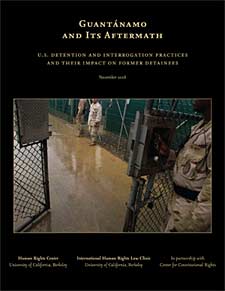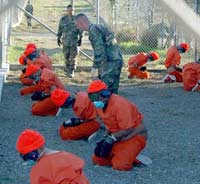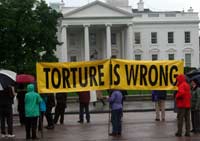Guantánamo detainees confirm 'arbitrary and humiliating' treatment by U.S. guards
Excerpts from Guantánamo and Its Aftermath
20 November 2008
BERKELEY — A new study based on extensive interviews with former detainees at the U.S.-run prison in Guantánamo Bay, Cuba, confirms that the abuses they suffered there were not only "cruel, humiliating, and degrading" — in the words of the study's authors — but "clearly [rose] to the level of torture."
The report, Guantánamo and Its Aftermath, was produced by the UC Berkeley-based Human Rights Center and the International Human Rights Law Clinic at Berkeley's Law School, in partnership with the nonprofit Center for Constitutional Rights. The two years of research supporting the study's findings and recommendations included interviews with released detainees from nine nations, as well as with 54 former guards, interrogators, and translators either based at Guantánamo or related to its operations; attorneys who had represented detainees were also interviewed, and extensive review of previously published media accounts conducted.
 The "flavor" of life at Guantánamo comes through all too clearly in the statements made by these respondents, whether published verbatim in the report text or summarized in the narrative. It doesn't make for pleasant or uplifting reading, as the excerpts reproduced here will confirm — but, as the study's authors state firmly, though the report provides "only a glimpse, albeit a very troubling one" into the detainees' experience, their hope is that subsequent studies will "[remove] the shroud of official secrecy that has hidden what has been taking place at Guantánamo and other detention facilities from full public scrutiny."
The "flavor" of life at Guantánamo comes through all too clearly in the statements made by these respondents, whether published verbatim in the report text or summarized in the narrative. It doesn't make for pleasant or uplifting reading, as the excerpts reproduced here will confirm — but, as the study's authors state firmly, though the report provides "only a glimpse, albeit a very troubling one" into the detainees' experience, their hope is that subsequent studies will "[remove] the shroud of official secrecy that has hidden what has been taking place at Guantánamo and other detention facilities from full public scrutiny."
The U.S. detention facility at Guantánamo Bay is an institution of total confinement designed largely to serve the needs of interrogators and their superiors. Rules and regulations governing detention have given guards and interrogators total control over nearly every aspect of the lives of detainees. Most former detainees interviewed for this study experienced their detention in Guantánamo as arbitrary and humiliating, punctuated at times by excruciating mental or physical pain. Many responded to perceived injustices by camp personnel through collective and individual acts of resistance, ranging from refusal to respond to orders to hunger strikes and attempted suicide. Years of confinement took a toll on the physical and mental health of many detainees who were completely dependent on camp personnel for their care. Similarly, detainees struggled for years without judicial recourse to prove their claims of wrongful detention. Release for respondents, when it came, seemed just as arbitrary as their transport to the island.
Chapter 4, "Guantánamo: No Exit"
 This image of orange-jumpsuited detainees in a holding area at Guantánamo's Camp X-Ray was taken by a U.S. Navy photographer in 2002.
This image of orange-jumpsuited detainees in a holding area at Guantánamo's Camp X-Ray was taken by a U.S. Navy photographer in 2002. As early as September 2002, high-level U.S. officials were aware of concerns within military and intelligence circles about how many of those held at the U.S. naval base in Guantánamo Bay were actually dangerous Al Qaeda or Taliban fighters. A senior Central Intelligence Agency analyst with extensive Middle East experience assessed detainees at the base in summer 2002, and concluded in a top-secret report that approximately a third of the population — at that time 200 of the 600 detainees — had no connection to terrorism. Many, he said, had been "caught in the dragnet. They were not fighters, they were not doing jihad. They should not have been there." Guantánamo's commander, Major General Michael Dunlavey, reportedly agreed with him and later estimated that half the camp population was mistakenly detained. A Federal Bureau of Investigation counterterrorism expert went even further and told a committee of the National Security Council that there were at most only 50 detainees worth holding at Guantánamo.
"Guantánamo and Its Aftermath," executive summary
 At Guantánamo's Camp Delta in 2006, the U.S. flag waved in the breeze.
At Guantánamo's Camp Delta in 2006, the U.S. flag waved in the breeze.Upon final arrival in Guantánamo, a ramp opened at the back of the cargo plane and detainees were off-loaded onto the tarmac. Most respondents were terrified of what awaited them in this strange new place, but initially at least they were relieved to move their legs and escape the painful positions in which they had been held.
At least one former detainee, however, was hopeful. "When it was my turn to be taken out of the plane, I could just see [some of my surroundings] from the corner of the goggles I was wearing. When I saw the American flag, I thought, 'We're in America now. They're going to treat me well here.'"
Chapter 2, "Afghanistan: The Long Journey Begins"
Six of the 31 former detainees held at Bagram described being chained to the ceiling in isolation cells or holding pens for prolonged periods. Next to the interrogation rooms was a chalkboard where guards wrote the number of hours detainees were to be suspended by handcuffs from the ceiling and allowed to rest on the floor. Detainees were reportedly unshackled and the "sleep deprivation" charts erased during [Red Cross] visits.
Chapter 2, "Afghanistan: The Long Journey Begins"
 Do short shackling, stress positions, environmental manipulation, and sexual humiliation … constitute "torture" or "cruel and inhuman and degrading treatment"?
Do short shackling, stress positions, environmental manipulation, and sexual humiliation … constitute "torture" or "cruel and inhuman and degrading treatment"?
A legal perspective on this question is informed by several international and regional instruments … including the International Covenant on Civil and Political Rights and the European Convention on Human Rights, [which] prohibit in absolute terms both torture and inhuman or degrading treatment. International humanitarian law equally forbids torture (whether physical or mental) and cruel, humiliating, or degrading treatment, as well as any form of physical or moral coercion.
What is key here — and often not amplified sufficiently in international human-rights instruments, but widely recognized by health professionals who treat victims of torture and prisoner abuse — is the psychological damage that can result not only from individual acts of extreme cruelty but from the cumulative nature of seemingly less severe acts. . . . This suggests that such methods constitute cruel, humiliating, and degrading treatment and, in some cases, clearly rise to the level of torture.
Chapter 3: "Guantánamo: Pushed to the Breaking Point"
 In a June 2005 report, Brigadier General Jay Hood, in command of the Guantánamo prison camp, acknowledged several incidents of "mishandling" the Quran by U.S. guards on duty there.
In a June 2005 report, Brigadier General Jay Hood, in command of the Guantánamo prison camp, acknowledged several incidents of "mishandling" the Quran by U.S. guards on duty there.
Twelve respondents related incidents of guards at Kandahar and Bagram [Afghanistan] desecrating the Quran. To Muslims, the text in its original Arabic is considered the literal word of God, revealed to Muhammad through the angel Gabriel, and a source of divine guidance and direction for mankind. Intentionally insulting the Quran is considered blasphemous and, in some countries, desecrating a copy of the Quran is punishable by imprisonment. "One day I was reciting the Holy Quran," a former Bagram detainee recalled. "The soldier ordered me not to recite it. But I refused. I said, 'No, this is my religious book, I respect it, I want to recite it.' Then the soldier snatched it and threw it outside my cell where it stayed for almost three days until another soldier came and took it away." A former Kandahar detainee related an incident in which a soldier seized a copy of the Quran as if it were a football and kicked it in the direction of another soldier, who picked it up and "put it in a latrine bucket, saying this is where it belonged." Another former Kandahar detainee said he and his cellmates pleaded with a guard to stop sitting on the Quran; instead, the soldier opened the book and spat on it.
Chapter 2, "Afghanistan: The Long Journey Begins"

